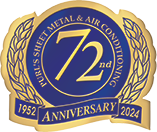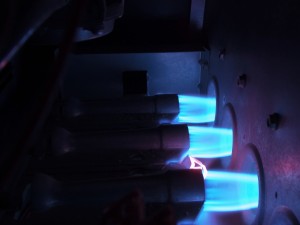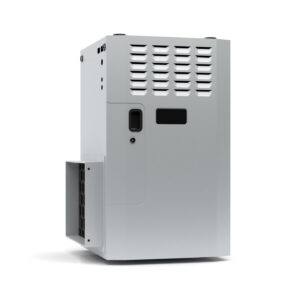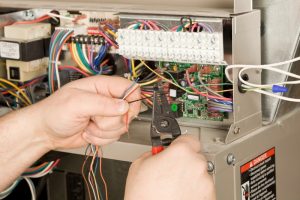Spring is approaching, and this is a time of year when many homeowners start to consider what upgrades or replacements they might need for their heating and air conditioning systems. You may have just gone through a winter with a furnace that was underperforming because of its age. Or you might know that your current air conditioning system isn’t up to handling another summer in the Central Valley.
You’ve come to the right people when it comes to great AC and heating in Fresno, CA. Our team can guide you through the process of replacing an older system if that’s the best choice for your house. One tricky part of getting a new HVAC system for homeowners is understanding the different efficiency ratings and what they mean. We’ll run down the three major ones you’ll need to know for heating and air conditioning.
AFUE
This is a rating used for furnaces. It stands for annual fuel utilization efficiency, and it’s expressed as a percentage. The percentage tells you how well a furnace converts its energy supply into heat. A gas furnace with 90% AFUE will turn 90% of the natural gas it burns into heat for the home, and the remaining 10% will escape the furnace as exhaust.
As of 2013, the minimum requirement for a furnace to receive the ENERGY STAR label from the Department of Energy is 80% AFUE. Many furnaces will score higher than this. High-efficiency condensing furnaces can have AFUE ratings in the high 90s, but they cost more to install. All electric furnaces have AFUE of 100%, but that’s because they don’t lose heat to exhaust. Electric furnaces will still cost more to run on average than gas furnaces because electricity is a more expensive energy source.
SEER
SEER (seasonal energy efficiency rating) is used for air conditioning systems and heat pumps when in cooling mode. It’s the ratio of the amount of heat a unit removes from the air in BTUs to the amount of electricity consumed in watt-hours, as measured over a full season of cooling. (There’s another rating, EER, which is done with only a single test.) The higher the SEER rating, the more efficient the unit. The current ENERGY STAR requirement for air conditioners and heat pumps is SEER of 14.5 or higher. High-efficiency units, such as variable flow refrigerant air conditioners, can have SEER in the 20s.
HSPF
This is a rating specific to heat pumps. Heat pumps work in two modes, heating and cooling, and have different ratings for those modes: SEER for cooling and HSPF for heating. HSPF stands for heating seasonal performance factor and is the ratio of the amount of heat brought into a house in BTUs to the amount of electricity consumed in watt-hours, measured over a full season of heating. HSPF is always lower than SEER for a unit, as heat pumps are less efficient in heating mode. The ENERGY STAR minimum for HSPF is 8.5.
The efficiency of any new system you have installed is important, but it isn’t the only factor. You’ll want the help of our professionals to find the ideal unit to provide comfort to your house as well as energy savings.
Call Purl’s Sheet Metal & Air Conditioning when you’re interested in a new HVAC system installation. Uncompromised Quality & Customer Service Since 1952.
Continue Reading
Tags: Air Conditioning Installation, Fresno, Heating System Installation
Posted in Heating | Comments Off on Understanding SEER, AFUE, and Other Efficiency Ratings for HVAC Systems



 One of the trickiest parts of navigating a new heating system installation for a house is figuring out energy efficiency ratings and what they mean. People want their heating systems to use less energy if possible, but they may not understand what the efficiency ratings mean and if it’s worth it to pay more to install a high-efficiency system.
One of the trickiest parts of navigating a new heating system installation for a house is figuring out energy efficiency ratings and what they mean. People want their heating systems to use less energy if possible, but they may not understand what the efficiency ratings mean and if it’s worth it to pay more to install a high-efficiency system.  You may be in the middle of deciding on a new furnace installation for your home. Fall is the best time to have this job done. If you’re still on the fence about getting a new furnace, call our technicians for assistance. We’ll provide you with honest and straightforward answers about whether it’s time to send your current furnace to the scrapheap and put in a new one, or if repairs can keep a heating system working effectively and efficiently for a few more years.
You may be in the middle of deciding on a new furnace installation for your home. Fall is the best time to have this job done. If you’re still on the fence about getting a new furnace, call our technicians for assistance. We’ll provide you with honest and straightforward answers about whether it’s time to send your current furnace to the scrapheap and put in a new one, or if repairs can keep a heating system working effectively and efficiently for a few more years. We’ve often talked about maintaining safety with gas furnaces, which is a topic that concerns many homeowners. But what about electric furnaces? Some homes must rely on this type of heater because they lack a connection to a gas main. Are electric furnaces much safer? Is there any reason to worry about them?
We’ve often talked about maintaining safety with gas furnaces, which is a topic that concerns many homeowners. But what about electric furnaces? Some homes must rely on this type of heater because they lack a connection to a gas main. Are electric furnaces much safer? Is there any reason to worry about them? A new year is starting and you’re probably making some long-term plans. If you’re reading this, a new HVAC system is likely part of those plans. You’ve definitely come to the right people—we’ve worked on
A new year is starting and you’re probably making some long-term plans. If you’re reading this, a new HVAC system is likely part of those plans. You’ve definitely come to the right people—we’ve worked on